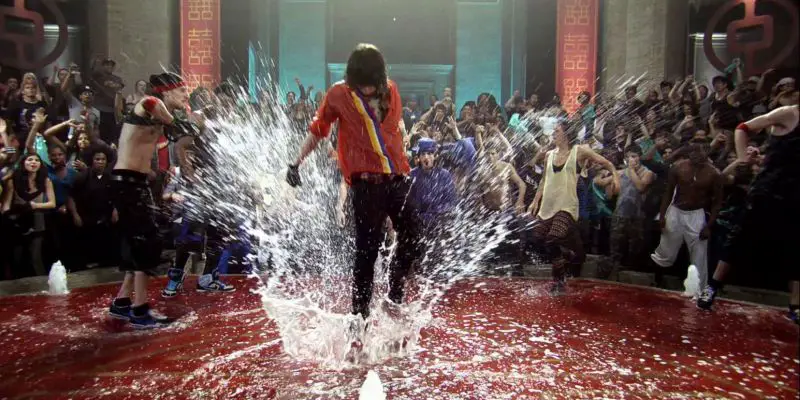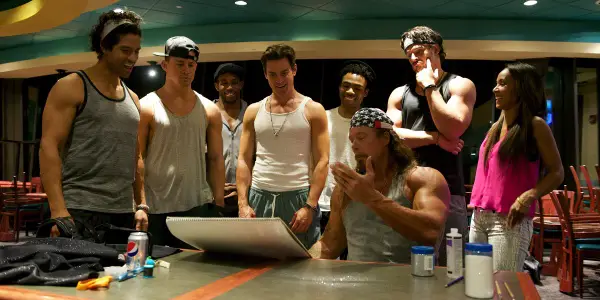How STEP UP 3D And MAGIC MIKE XXL Take Viewers Back To The Golden Age Of Musicals

Kenneth currently resides in Northern Virginia. He's most interested in…
Let’s start with a brief history of musical cinema. When Al Jonson‘s 1927 film The Jazz Singer became both a critical and commercial success, it ushered in the wave of “talkies”: films with audio. With the Vitaphone sound technology founded in 1926, it proved to studios and audiences alike that feature-length efforts in the musical genre were profitable (Warner Bros. produced the picture for a rather higher budget of $422,000 at the time to make back more than $3.9 million domestically). Fast forward eight years to the release of Becky Sharp: the first motion picture to be completely shot in Technicolor technology. Considered ground-breaking for its time, the historical romance possessed a ethereal quality in its use of light and color.
Then came the post-classical era: actors and directors such as Vincente Minnelli, Gene Kelly and Judy Garland played with the genre to great lengths and their contributions can be still seen in other genres as well. But decades later, interest in musicals and their profitability at the box office have declined greatly. Only a few efforts have ever become actual hits from the last two decades, such as 2002’s Best Picture-winning Chicago and 2012’s Les Miserables.
As the two systems of Technicolor and sound had taken cinema to new heights and laid the essential groundwork for the genre, two recent dance films of this decade transports their audiences to the time of post-classical era musicals: 2010’s Step Up 3D and 2015’s Magic Mike XXL.
Step Up 3D (Directed by Jon M. Chu, 2010)
There’s a phrase that the leader of the House of Pirates (the aptly named dance crew the film follows) constantly comes back to throughout: “born from a boombox”, which is a description for those who were “born to dance while others learned to.” Hackneyed, borderline mawkish moments and dialogue, such as that, fill the hollow spaces of Step Up 3D in between effervescent dance sequences. From start to finish, director Jon M. Chu allows these scenes to use every interior and exterior space of the set to their full potential.

Even with a non-3D viewing, Chu’s playfulness can be thoroughly felt with even the smallest of gestures as the throwing of dirt or water by a dancer onto the lens of the camera, messing with the immersion and the awareness of the audience. The more blatant nods to its classical roots, especially the dance number shared between the main character of Moose and his best friend/romantic interest Camille (set to an upbeat remix of Frank Sinatra‘s “I Won’t Dance”), actually detract the picture somewhat from being a whole new animal of its own, but also renders as heartfelt and earnest.
The final battle of movement takes place between the House of Pirates and their ludicrously evil rivals of the House of Samurai. It is a truly final summation of everything involving dance we’ve seen beforehand in the film: an uproarious eruption of light, bodies against bodies, color and sound. Logic is replaced with flow, as it begins to resemble how music videos operate more than an actual film. 3D enables Chu to add just another layer of innovation to a film that is a true product of digital culture and its technologies.
Its sheer amount of infectious energy and the complexity involved is something most audiences would take for granted, but proves Step Up 3D is a masterwork in formalism.
Magic Mike XXL (Directed by Gregory Jacobs, 2015)
With the first installment centered around capitalism, its interlocking systems and the conversion of the bodies in male entertainment into products, director Steven Soderbergh had taken expectations of the 2012 box office surprise and decimated them for those who were geared up for a female pleasuring feature.Magic Mike XXL comes close to being said feature with its progressiveness in gender politics and attitude towards sexuality and pleasure.

The film zeroes in on the individual. Their wants, needs and aspirations in the land of the free and the home of the brave. Each member of the group is actively chasing their own capitalistic ventures, completely divorced from their roles as male strippers. These come into action later on, when each person performs their own mini-routine that plays with their talents to make it completely their own.
Yet as it operates as an incredibly modern road trip picture, the feeling of a traditionally grand musical leading up to the big final number cannot be shaken. Each stop along with the way to the destination of a Myrtle Beach stripper convention, whether it’s Mad Mary’s Cocktail Lounge in Jacksonville or the southern mansion run by Jada Pinkett Smith‘s character named Rome, adds ostentatious texture to an already palpable film of physicality. The passion and chemistry between the entire cast adds even more momentum and excitement on top of the urgent narrative.
The images to go along with it are full of wide compositions that use light and shadow in refreshing ways. But as XXL chugs along to its celebratory end, its most compelling aspect reveals itself: how all races, body types and genders are shot through a democratic lens from beginning to end and never makes a big deal about it; everyone is equal in this world.
Conclusion
In a place where cynical and ineffective action blockbusters control the mainstream cinematic landscape weekend after weekend, the musical genre has been forced to take the back seat. Wholehearted films of dance and music are almost kicked to the side with a knee-jerk reaction and labeled as “over-sentimental” by the masses. But with such efforts like these two modestly-budgeted and (for the most part) commercially successful efforts, they prove that musicals still have a fighting chance by balancing both the classical and the contemporary.
Do you think musicals could make a comeback? What is your favorite musical?
Share what you think in the comments.
Does content like this matter to you?
Become a Member and support film journalism. Unlock access to all of Film Inquiry`s great articles. Join a community of like-minded readers who are passionate about cinema - get access to our private members Network, give back to independent filmmakers, and more.
Kenneth currently resides in Northern Virginia. He's most interested in experimental cinema and film theory. His favorite directors include Michael Mann, James Benning, Claire Denis, David Fincher and others. His favorite films consists of Miami Vice, Eyes Wide Shut, Landscape Suicide and more.













